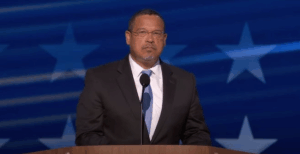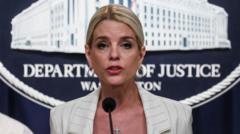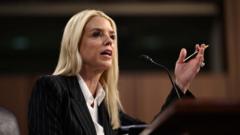Minnesota Attorney General Keith Ellison has initiated a lawsuit against President Trump's Executive Order 14201, which mandates biological females as the sole participants in women’s sports at federally funded institutions. The unfolding legal conflict poses significant questions about the interpretation of the Equal Protection Clause and Title IX compliance at a national level.
Minnesota Challenges Trump's Executive Order on Women's Sports

Minnesota Challenges Trump's Executive Order on Women's Sports
The legal battle begins as Minnesota files a lawsuit against President Trump's executive action aimed at restricting trans athletes from competing in women's sports.
In a significant step towards establishing a policy for women’s athletics, President Donald Trump enacted Executive Order 14201 on February 5, 2025, which is dubbed “Keeping Men Out of Women’s Sports.” This order compels educational institutions that receive federal aid to limit participation in women’s sports to athletes identified as biologically female.
The Minnesota Attorney General, Keith Ellison, has responded by filing a federal lawsuit challenging the constitutionality of this executive order. Ellison argues that the order violates the rights of transgender individuals and undermines the state's Human Rights Act. The lawsuit is aimed at obtaining an injunction to prevent the federal mandate from being enforced within the state.
In defense of the executive order, U.S. Attorney General Pam Bondi emphasized that the Trump administration is dedicated to upholding the original intentions of Title IX, which serves to protect female athletes from discrimination. According to Bondi, allowing biological males to compete in women's sports not only jeopardizes fairness but alters the competitive landscape in a disadvantageous manner for female athletes.
Legal experts predict that the ongoing court proceedings could lead to a landmark interpretation of both the Equal Protection Clause and Title IX’s purpose. The ruling may have widespread ramifications for educational institutions nationwide regarding their athletic policies.
Supporters of Trump's order assert that it aims to restore equity in women's sports and safeguard opportunities for female athletes who could lose scholarships and accolades due to the participation of biological males.
The legal confrontation between the state of Minnesota and the Trump administration highlights significant constitutional questions revolving around sex-based rights, federal funding stipulations, and the balance of state versus federal authority. As the litigation progresses, legal observers throughout the country will be attentive to its potential to set significant precedents.
The Minnesota Attorney General, Keith Ellison, has responded by filing a federal lawsuit challenging the constitutionality of this executive order. Ellison argues that the order violates the rights of transgender individuals and undermines the state's Human Rights Act. The lawsuit is aimed at obtaining an injunction to prevent the federal mandate from being enforced within the state.
In defense of the executive order, U.S. Attorney General Pam Bondi emphasized that the Trump administration is dedicated to upholding the original intentions of Title IX, which serves to protect female athletes from discrimination. According to Bondi, allowing biological males to compete in women's sports not only jeopardizes fairness but alters the competitive landscape in a disadvantageous manner for female athletes.
Legal experts predict that the ongoing court proceedings could lead to a landmark interpretation of both the Equal Protection Clause and Title IX’s purpose. The ruling may have widespread ramifications for educational institutions nationwide regarding their athletic policies.
Supporters of Trump's order assert that it aims to restore equity in women's sports and safeguard opportunities for female athletes who could lose scholarships and accolades due to the participation of biological males.
The legal confrontation between the state of Minnesota and the Trump administration highlights significant constitutional questions revolving around sex-based rights, federal funding stipulations, and the balance of state versus federal authority. As the litigation progresses, legal observers throughout the country will be attentive to its potential to set significant precedents.





















